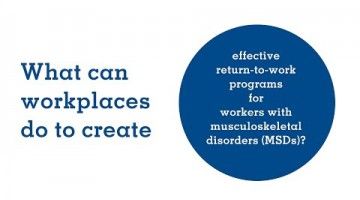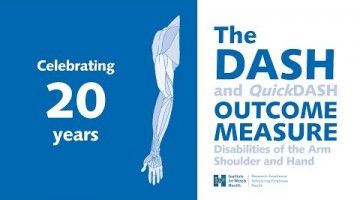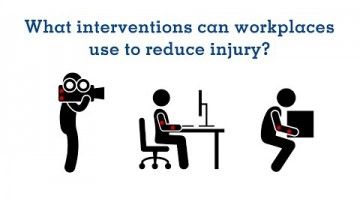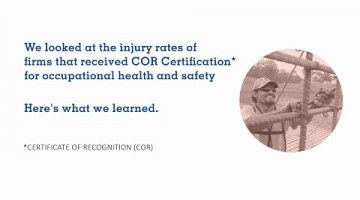
Participatory approach to health and safety in long-term care
Long-term care homes are high-risk environments, and strategies to reduce workplace injuries are essential to protecting long-term care workers and the quality of care provided to residents. This video whiteboard explains why and how a participatory approach to injury prevention can help prevent injuries by involving front-line staff in the identification and control of workplace hazards.
Posted October 2019

Supervisor's response to work injury matters
Supervisors are busy. They’re always juggling multiple demands for their time and attention. But that moment when they learn a worker is injured, do they react with concern and empathy or blame and skepticism? As this research-based video from Institute for Work & Health (IWH) sums up, a supervisor’s response can make a difference to whether an injured worker returns to work successfully within a few months. It’s one of the ways supervisors matter.
Posted September 2019

Sitting or standing? Which is best?
If you’re confused by seemingly duelling headlines about the negative health effects of prolonged sitting and prolonged standing, this video may help clear things up. Two of the scientists behind these headlines work at the Institute for Work & Health, so we put them before the camera, side by side, to sort out the take-away message.
Posted November 2018

Trouvez les travailleurs à protéger
La vulnérabilité en santé et en sécurité au travail ne dépend pas de qui vous êtes. Elle dépend des fonctions que vous accomplissez. Nos recherches montrent qu’il existe une meilleure façon de repérer les travailleurs vulnérables.
Posted August 2017

Find the workers you need to protect
How do you tell which workers are vulnerable to injury? Occupational health and safety (OHS) vulnerability is not about who people are. It's about the work they do. Use the OHS Vulnerability Measure to identify workers you need to protect.
Posted August 2017

Creating effective return-to-work programs for workers with MSDs
What workplace-based interventions are effective in helping workers with musculoskeletal disorders (MSDs) recover and return to work after a period of work absence? This is the question that a team of researchers from the Institute for Work & Health (IWH) in Toronto, Canada, and the Institute for Safety, Compensation and Recovery Research (ISCRR) in Melbourne, Australia, set out to answer through a systematic review of high quality research on the topic.
Posted May 2017

Celebrating 20 years of the DASH Outcome Measure
In 1996, when the DASH was developed by the Institute for Work & Health (IWH) and the American Association of Orthopedic Surgeons, no measure had previously existed to assess the disability and function of the arm, shoulder and hand as a whole. Today, this outcome measure is used across the world, and is available in 55 languages and dialects. Developers of the DASH talk about why they think the tool has stood the test of time.
Posted January 2017

Preventing upper extremity injuries at work
Strong evidence suggests that workplace-based resistance training can help prevent and manage musculoskeletal disorders (MSDs) of the upper extremity, which includes the neck, shoulder, arm, elbow, wrist and hand. That’s one of the key findings coming out of a systematic review conducted by the Institute for Work & Health (IWH).
Posted October 2016

The effect of COR certification on injury rates
We looked at the injury rates of firms that received COR Certification for occupational health and safety.
Posted June 2016

Understanding injury risk and recovery among shift workers
Research evidence has been accumulating on the adverse health consequences of night, evening and rotating shift work. New research is now suggesting that, not only are shift workers at greater risk of work injury, they are more likely to have a harder time recovering should an injury occur. What's more, injury rates don't improve when shift workers switch into regular 9-to-5 work schedules, as Mustard Post-doctoral fellow Dr. Imelda Wong explains.
Posted November 2015

Supporting workers with arthritis through job accommodations
A study about workplace supports for people with arthritis suggests that many affected workers don’t feel they need frequent help. The study, conducted by the Institute for Work & Health (IWH), also finds that people who can access the workplace supports often report better outcomes at work. That can mean less job disruption, greater ability to concentrate on tasks and fewer changes to work hours.
Posted September 2015

Divergent trends in work-related and non-work-related injury rates in Ontario
Work-related injury rates in Ontario fell by 30 per cent from 2004 to 2011. In contrast, rates of injuries outside of work did not change. According to a study by the Institute for Work & Health (IWH), if injuries due to leisure, recreation or other non-work activities had fallen at the same rate as work-related injuries, the province would have seen 200,000 fewer injuries in 2011.
Posted February 2015

Exploring the role of gender in work-related injury, chronic illness and recovery
Institute Scientist Dr. Peter Smith talks about his five-year research program into how sex and gender shape risk of work injury, time off work after a work injury, and the relationship between the work environment and chronic illnesses.
Posted September 2014

Health and safety issues for low-wage temp agency workers
The complex employment relationship between temporary agency workers, temp agencies and client employers creates loopholes and incentives that may leave low-wage temp agency workers more vulnerable to workplace injuries, says research from the Institute for Work & Health.
Posted July 2014

Nachemson 2013: Unique research-policy partnership
Dr. Mieke Koehoorn, co-lead of the Partnership for Work, Health & Safety at the University of British Columbia and recipient of the 2013 Alf Nachemson Memorial Lectureship, talks about the unique research-policy partnership between the University of British Columbia and WorkSafeBC.
Posted November 2013

Nachemson 2013: Impact of research on policy
Dr. Mieke Koehoorn, co-lead of the Partnership for Work, Health & Safety at the University of British Columbia and recipient of the 2013 Alf Nachemson Memorial Lectureship, gives examples of the way in which research has had an impact on policy in British Columbia.
Posted November 2013

Nachemson 2013: Challenges in the research-policy relationship
Dr. Mieke Koehoorn, co-lead of the Partnership for Work, Health & Safety at the University of British Columbia and recipient of the 2013 Alf Nachemson Memorial Lectureship, talks about the challenges facing researchers in developing strong working relationships with policy-makers.
Posted November 2013
